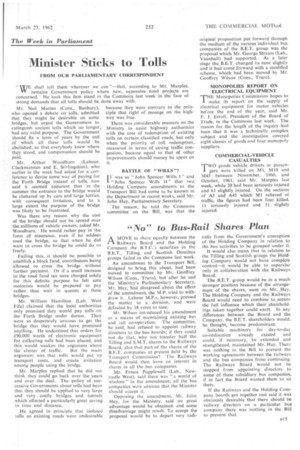Minister Sticks to Tolls
Page 49

If you've noticed an error in this article please click here to report it so we can fix it.
FROM OUR PARLIAMENTARY CORRESPONDENT
" WE shall toll them wherever we can "—that, according to Mr. Marples, remains Government policy where new, expensive road projects are concerned. He took this firm stand in the Commons last week in the face of strong demands that all tolls should be done away with.
Mr. Neil Marten (Cons., Banbury), who opened a debate on tolls, admitted that they might be desirable on some bridges, but urged the Government to extinguish ancient tolls which no longer. had any valid purpose. The Government should fix a term of years by the end of which all these tolls would be abolished, so that everybody knew where they stood, and compensation should be paid.
Mr. Arthur Woodburn (Labour. Clackmannan and E. Stirlingshirc), who earlier in the week had asked for a conference to devise some way of paying for the Forth Bridge instead of tolls, now said it seemed apparent that in the summer the entrance to the bridge would be cluttered up by cars and large lorries, with consequent irritation, arid to a large extent the purpose of the bridge was likely to be frustrated.
Was there any reason why the cost of the bridge should not be spread over the millions of vehicle owners, asked Mr. Woodburn. He would rather pay in the form of insurance, even if he seldom used the bridge, so that when he did want to cross the bridge he could do so freely.
Failing this, it should be possible to establish a block fund, contributors being allowed to cross the bridge without further payment. Or if a small increase in the road fund tax were charged solely for this definite purpose he felt sure motorists would be prepared to pay rather than wait in queues at these bridges.
Mr. William Hamilton (Lab. West Fife) claimed that the local authorities only promised they would pay tolls on the Forth Bridge under duress. They were so desperately anxious to get the bridge that they would have promised anything. He understood that orders for £90,000 worth of electronic equipment for collecting tolls had been placed, and this would weaken the argument about the clutter of traffic. But the main argument was that tolls would put up transport costs, and create irritation among people using the bridge.
Mr. Marples replied that he did not think they could go back over the years and over the deal. The policy of successive Governments about tolls had been that they should be applied to very large and very costly bridges and tunnels which effected a particularly great saving in time and distance.
He agreed in principle that isolated tolls on existing roads were undesirable because they were contrary to the principle that right of passage on the highway was free.
There was considerable pressure on the Ministry to assist highway authorities with the cost of redemption of existing tolls on certain classified roads, but only when the priority of toll redemption, measured in terms of easing traffic congestion, became equal to that of other improvements should money be spent on it.
BATTLE OF "WILLS "?
IT was as "John Spencer Wills I and
"John Spencer Wills II" that two Holding Company amendments to the Transport Bill had come to be known in the Department in recent weeks, said Mr. John Hay, Parliamentary Secretary.
The reason, he told the Commons committee on the Bill, was that the original proposition put forward through the medium of the various individual bus companies of the B.E.T. group was the proposal which Mr. George Strauss (Lab., Vauxhall) had supported. At a later stage the B.E.T. changed its tune slightly and it had come forward with a modified scheme, which had been moved by Mr. Geoffrey Wilson (Cons., Truro).
MONOPOLIES REPORT ON ELECTRICAL EQUIPMENT
THE Monopolies Commission hopes to make its report on the supply of electrical equipment for motor vehicles before the end of the year, said Mr. F. J. Erroll, President of the Board of Trade, in the Commons last week. The reason for the length of the inquiry had been that it was a technically complex subject and the investigation covered eight classes of goods and four monopoly suppliers.
COMNIERCIAL-VEHICLE CASUALTIES
TWOgoods vehicle drivers or passengers were killed on MI, M10 and M45 between November, 1960. and October, 1961, said Mr. Marples last week, while 39. had been seriously injured and 61 slightly injured. On the sections of A5 and A45 which M1 relieved of traffic, the figures had been four killed, 11 seriously injured and 31 slightly injured.




















































































































